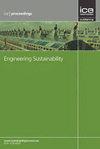Framing blockchain-integrated digital twins for emergent healthcare management at local and city levels: a proof of concept
IF 1.5
4区 工程技术
Q3 ENGINEERING, CIVIL
Proceedings of the Institution of Civil Engineers-Engineering Sustainability
Pub Date : 2023-05-11
DOI:10.1680/jensu.22.00073
引用次数: 0
Abstract
It has been witnessed that digital technology has the potential to improve the efficiency of emergent healthcare management in COVID-19, which however has not been widely adopted due to unclear definition and configuration. This research aims to propose a proof of concept of digital twins for emergent healthcare management through configuring the cyber and functional interdependencies of healthcare systems at local and city levels. Critical interdependencies of healthcare systems have been firstly identified at both levels, then the information and associated cyber and functional interdependencies embedded in seven critical hospital information systems (HISs) have been identified and mapped. The proposed conceptual digital twin-based approach has been then developed for information coordination amongst these critical HISs at both local and city levels based on permissioned blockchain to (1) integrate and manage the information from seven critical HISs, and further (2) predict the demands of medical resources according to patient trajectory. A case study has been finally conducted at three hospitals in London during the COVID-19 period, and the results showed that the developed framework of blockchain-integrated digital twins is a promising way to provide more accurate and timely procurement information to decision-makers and can effectively support evidence-based decisions on medical resource allocation in the pandemic.为地方和城市层面的紧急医疗管理构建区块链集成数字双胞胎:概念验证
事实证明,数字技术具有提高COVID-19应急医疗管理效率的潜力,但由于定义和配置不明确,数字技术尚未得到广泛采用。本研究旨在通过配置地方和城市层面医疗保健系统的网络和功能相互依赖关系,为紧急医疗保健管理提出数字孪生概念的证明。首先在这两个层面确定了医疗保健系统的关键相互依赖性,然后确定并绘制了七个关键医院信息系统(HISs)中嵌入的信息和相关的网络和功能相互依赖性。然后,根据允许的区块链,提出了基于数字孪生的概念方法,用于在地方和城市级别的这些关键HISs之间进行信息协调,以(1)整合和管理来自七个关键HISs的信息,并进一步(2)根据患者轨迹预测医疗资源的需求。最终在伦敦三家医院进行了新冠肺炎疫情期间的案例研究,结果表明,开发的区块链集成数字孪生框架有望为决策者提供更准确、及时的采购信息,并能有效支持疫情期间医疗资源配置的循证决策。
本文章由计算机程序翻译,如有差异,请以英文原文为准。
求助全文
约1分钟内获得全文
求助全文
来源期刊

Proceedings of the Institution of Civil Engineers-Engineering Sustainability
ENGINEERING, CIVIL-ENGINEERING, CIVIL
CiteScore
3.70
自引率
16.70%
发文量
44
审稿时长
>12 weeks
期刊介绍:
Engineering Sustainability provides a forum for sharing the latest thinking from research and practice, and increasingly is presenting the ''how to'' of engineering a resilient future. The journal features refereed papers and shorter articles relating to the pursuit and implementation of sustainability principles through engineering planning, design and application. The tensions between and integration of social, economic and environmental considerations within such schemes are of particular relevance. Methodologies for assessing sustainability, policy issues, education and corporate responsibility will also be included. The aims will be met primarily by providing papers and briefing notes (including case histories and best practice guidance) of use to decision-makers, practitioners, researchers and students.
 求助内容:
求助内容: 应助结果提醒方式:
应助结果提醒方式:


